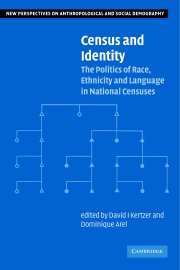
-
Select format
-
- Publisher:
- Cambridge University Press
- Publication date:
- 03 December 2009
- 15 November 2001
- ISBN:
- 9780511606045
- 9780521004275
- Dimensions:
- Weight & Pages:
- Dimensions:
- (228 x 152 mm)
- Weight & Pages:
- 0.366kg, 224 Pages
- Subjects:
- Social and Cultural Anthropology, Demography, Social Statistics, Anthropology, Sociology
You may already have access via personal or institutional login- Subjects:
- Social and Cultural Anthropology, Demography, Social Statistics, Anthropology, Sociology
Book description
The Politics of Race, Ethnicity and Language in National Censuses examines the ways that states have attempted to pigeon-hole the people within their boundaries into racial, ethnic, and language categories. These attempts, whether through American efforts to divide the US population into mutually exclusive racial categories, or through the Soviet system of inscribing nationality categories on internal passports, have important implications not only for people's own identities and life chances, but for national political and social processes as well. The book reviews the history of these categorizing efforts by the state, and offers a theoretical context for examining them, illustrating the case with studies from a range of countries.
Reviews
‘Apart from being essential for cross-cultural health researchers readers will also find specific chapters on Uzbekistan, Burundi and Rwanda and France as well as comparative material for Europe. I thorough recommend that health service researchers read this book.’
Source: International Journal of Social Psychiatry
‘… rich materials … a stimulating book …’.
Source: International Sociology
'… splendid … Although many have remarked on the relevance of censuses for contemporary minority issues and identity politics, this is the first collaborative volume that addresses the issue comparatively.'
Source: Journal of Peace Research
Contents
Metrics
Altmetric attention score
Full text views
Full text views help Loading metrics...
Loading metrics...
* Views captured on Cambridge Core between #date#. This data will be updated every 24 hours.
Usage data cannot currently be displayed.
Accessibility standard: Unknown
Why this information is here
This section outlines the accessibility features of this content - including support for screen readers, full keyboard navigation and high-contrast display options. This may not be relevant for you.
Accessibility Information
Accessibility compliance for the PDF of this book is currently unknown and may be updated in the future.


